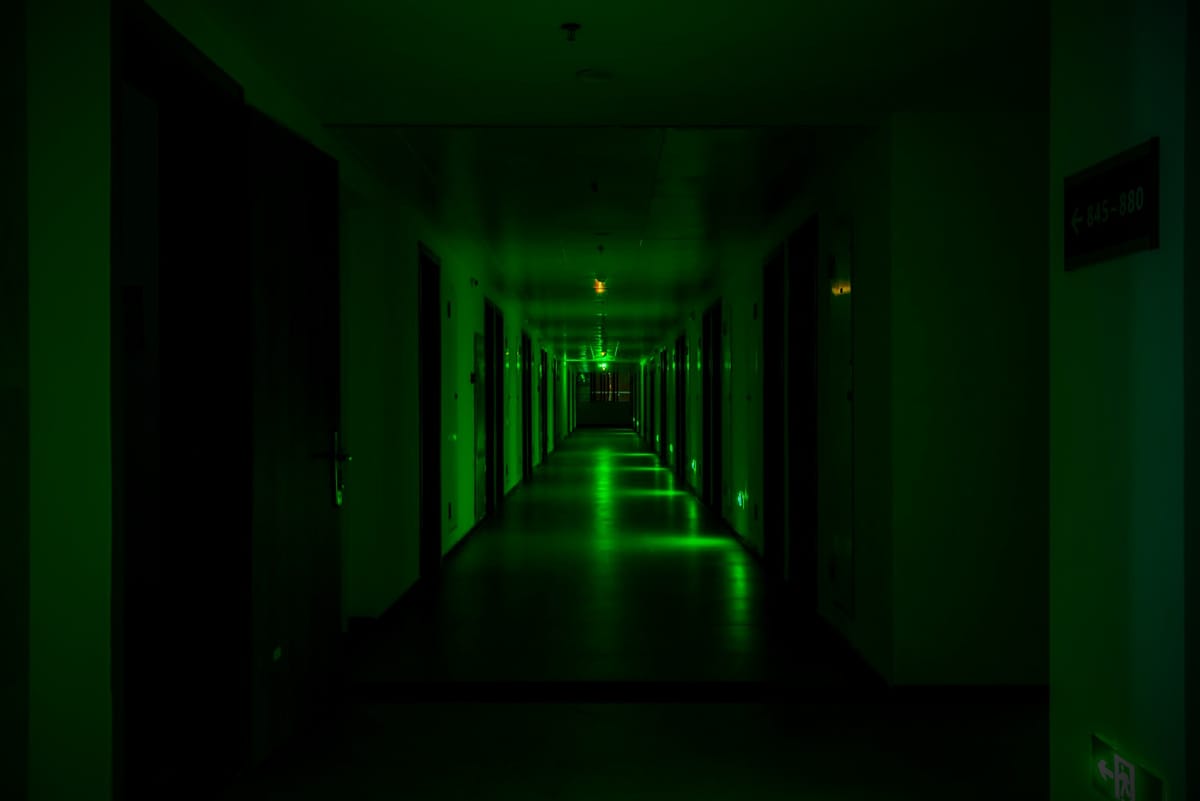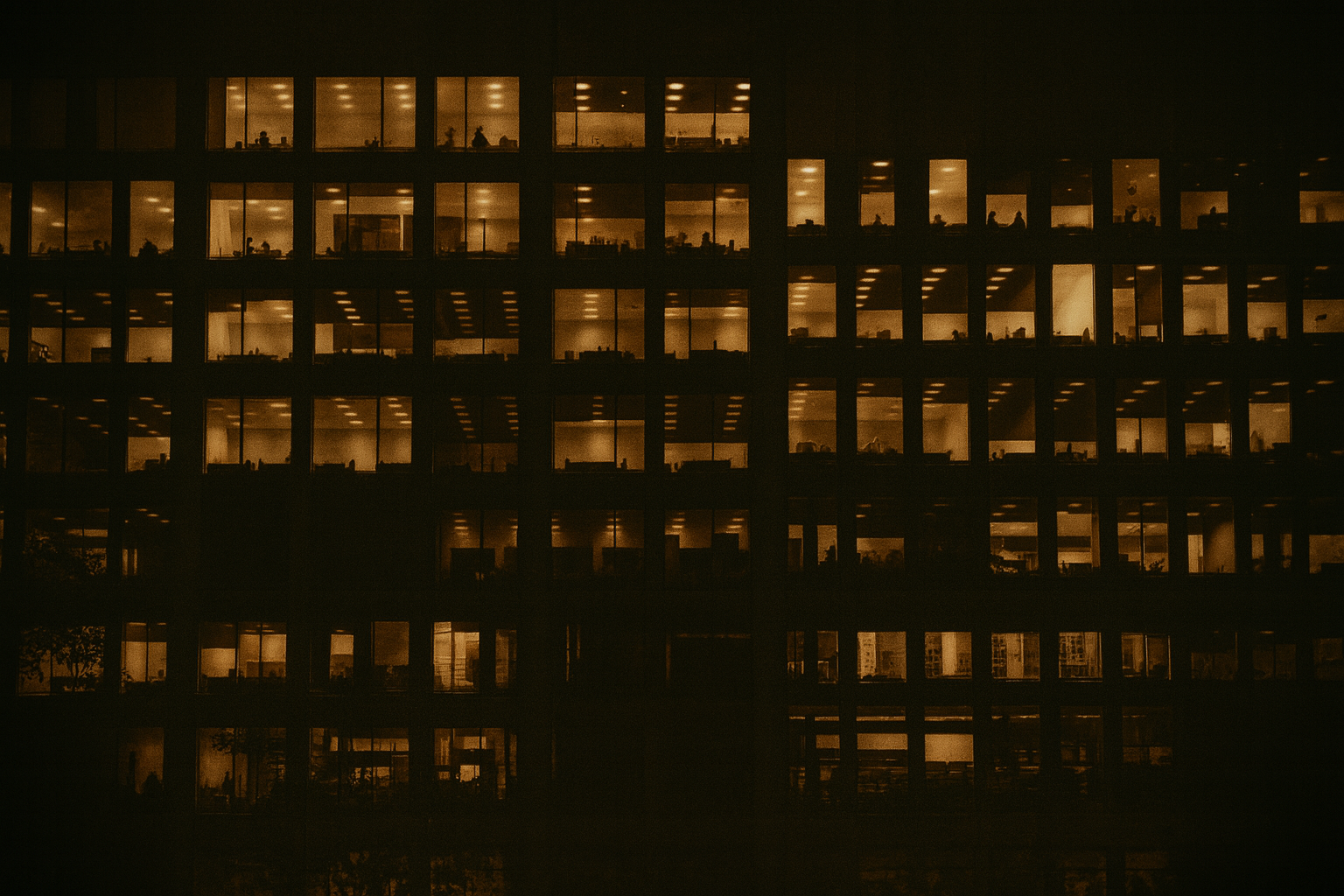And Other Invisible Things
I rarely come to the office—most of my work happens from home, filtered through video calls and shared documents. But when another VPN crash demanded my physical presence to connect directly to the network, I chose to come in after hours, when the building drops its daytime pretense and becomes what it really is: a container for labor, nothing more. Last Tuesday, 10:47 PM, deadline blown, I heard the service elevator exhale. Carlos wheeled his gray bin past the workstation I had claimed temporarily as my desk. In this accidental convergence of schedules—him cleaning, me analyzing—we'd found an odd rhythm over the past few months.
He paused at my wastebasket. Looked at me directly. Not the sliding glance of someone navigating around an obstacle, but human recognition.
"You're always here," he said. Not a question.
"So are you," I said.
He nodded, dumped my trash—mostly coffee cups, a metaphor I choose not to examine—and continued down the hall. The squeak of his cart faded. But something had shifted. For those few seconds, we'd both existed in the same frame, neither of us background to the other's foreground.
This is how I began to see them—the hidden ones whose labor makes civilization possible. Not invisible like my wavering reflection in the train window, but deliberately hidden. Carlos exists in the building's schedule but not its directory. His work appears only as absence—the absence of trash, of dust, of yesterday's evidence.
The hands that picked this morning's strawberries belong to María—not her real name, because visibility itself is a luxury she can't afford. She rises at 3 AM in Salinas, darkness still complete, her arthritis already announcing whether fog will roll in by noon. By the time I slice these berries for my yogurt, she's six hours into a shift that pays by the flat, not the hour. Thirty-two pounds per flat. Twelve dollars if she's lucky. Two thousand pounds of strawberries to earn what I spend on lunch.
Baldwin knew this mathematics of erasure. "The white republic," he wrote, "needed cheap labor and was determined to have it." He was writing about cotton, but the equation remains unchanged—only the crop rotates. Black hands, brown hands, always hidden hands, building wealth that will never be theirs. The strawberry industry generates approximately $2 billion annually in California alone. María sees perhaps ten thousand of it in a good year, if her body holds out, if ICE doesn't raid, if the contractor who holds her wages shows up on Friday.
I learned this years ago at a roadside stand in Watsonville, talking with women on their water break. They laughed when I asked about benefits—not cruel laughter, but the kind that acknowledges absurdity. "Benefits?" one said, adjusting the bandana that protected her face from pesticides. "The benefit is tomorrow we can come back." They shared their water with me anyway, from a cooler they'd bought themselves because the company's station was a quarter-mile away. Kindness despite exhaustion, not because of it.
The woman who shared her water had hands that told stories—split thumbnails from the repetitive pluck and twist, stained purple-red, as if she'd been caught in some beautiful crime. She'd been doing this for eighteen years. Her daughter just graduated from UC Davis. "Engineering," she said, and for a moment her exhaustion lifted. "She won't have to hide."
But hiding is precisely what the system demands. Baldwin understood America's comfort requires not seeing whose backs it's built on. The strawberries arrive in their plastic shells, clean and gleaming, scrubbed of their history. No trace of María's 3 AM rising, her racing against the sun before the heat makes the berries too soft, her calculating whether she can afford the clinic visit for her swelling joints. The container says "Product of USA," as if the nation itself, not María's body, had somehow generated this sweetness.
The shirt I bought on sale last month carries its own hidden history. The tag reads "Made with Pride in Bangladesh"—pride being what they call it when a fourteen-year-old girl, whose documents claim she's eighteen, guides fabric through a machine for twelve hours straight. Four dollars a day, if she makes quota. The cotton dust settles in her lungs like snow that never melts, damage accumulating silently for years.
She sends half her earnings home to siblings she's never met—her parents sent her to Dhaka before she could remember their faces. The factory floor holds three hundred girls like her, all bent over machines, all breathing the same white dust. This is ghost capitalism—prosperity built on invisible bones. But these aren't ghosts. They're girls with names like Rashida and Fatima, who eat rice from tin containers and dream in languages the floor managers don't bother learning.
The colonial arithmetic Baldwin traced from Mississippi cotton fields runs through these Dhaka factories unchanged. Brown hands, different continent, same extraction. The shirt costs forty dollars in the department store. She sees fifty cents of it. The rest disappears into a supply chain designed to launder conscience as efficiently as cotton—each middleman, each border crossing, each markup adding distance between the wearing and the making.
In California, the prison system has discovered the perfect labor force—workers who can't quit, can't unionize, can't even be seen. The state now depends on inmate firefighters, paying them one dollar a day to save million-dollar homes in Malibu. The program keeps expanding as regular firefighter positions get cut. The mathematics are irresistible: why pay a living wage when you can pay a dying one?
But the real innovation is in the supply chain. Mandatory minimums, three-strike laws, detention centers proliferating like tumors—all designed to harvest bodies from Black and brown neighborhoods. Private prisons guarantee their investors ninety percent occupancy. Empty beds mean lost profits, so the system creates criminals to fill them.
School-to-prison pipelines become recruitment channels. From Angola to Arizona, detention centers transform into factories where immigrants sew American flags for sixty cents an hour—patriotism manufactured by the dispossessed.
Steinbeck called workers "the starving body of the nation," but he couldn't have imagined a system that would imprison the body first, then starve it while forcing it to work. A letter in the local paper, signed only "W.C.F. #B-2847," described fighting fires for sixteen hours straight, lungs full of smoke that will kill him slowly, years after his sentence ends. He can't vote. After release, he can't be hired as a firefighter—regulations prohibit it. He saves houses for people who would cross the street to avoid him. Even his name has been replaced by numbers, the ultimate erasure.
This is the new plantation, requiring a constant harvest of bodies from streets to cells. The cotton has been replaced by license plates, fire lines, hand sanitizer bottled during pandemics. The overseer's whip replaced by solitary confinement, parole violations, the threat of deportation. But the equation remains: Black and brown bodies transformed into profit for people who will never see them.
At the hotel where I stayed last week for a conference I didn't want to attend, someone had turned down the corner of my bedsheet with geometric precision. The toiletries stood arranged like soldiers, each bottle exactly parallel. A chocolate, smaller than last year's, rested on the pillow—a signature that said "a human was here," though I never saw her.
She is always "her"—the global feminization of invisible labor means it's almost certainly a woman from El Salvador, the Philippines, Haiti, who cleaned this room. Empire's aftermath concentrated in service work—women carrying their countries' collapsed economies one room at a time. The hotel cut housekeeping hours by thirty percent this year while keeping the room count the same. She does forty-five rooms now where she once did thirty. The cart is too heavy—she pulls something in her shoulder every day, but worker's comp doesn't cover "independent contractors."
Tillie Olsen wrote about the exhaustion of working mothers whose labor goes unrecorded, whose art dies unborn in the spaces between other people's needs. This housekeeper leaves her own children before dawn to clean up after travelers who don't bother learning her name. The hotel doesn't bother learning her language. She exists only in the turned-down corners, the precisely arranged bottles, the shrinking chocolate that measures how much care the system still permits.
My packages appear at the door like offerings from invisible hands. The app won't show the driver's name—privacy protection, they claim, though privacy only flows upward. Today's driver is an engineer from Lagos with a master's degree that means nothing here, racing against an algorithm that tracks his every second. No time for my bathroom, barely time for his own—bottles in the van for emergencies, a detail I try not to think about.
The app calls him an "independent contractor"—independent of healthcare, air conditioning, rest breaks, the right to refuse unsafe routes. His accent triggers lower ratings from customers who complain they can't understand him, though he speaks three languages to their one. Brain drain reversed: the global South's educated professionals reduced to gig work in the global North, delivering toilet paper to tech workers who look through him like weather.
Sebald wrote about the accumulation of erasures, how absences pile up until they become a presence of their own. Each package delivered is a person dissolved, each driver becoming a ghost before they're even gone. The system creates phantoms—there but not there, essential yet invisible, their labor so completely separated from their humanity that saying "thank you" feels like speaking to the air.
Last week, retrieving a pen that had rolled behind the filing cabinet, I found a note. Handwritten on company letterhead, the ink faded but still readable:
"They gave me 5 minutes notice. If you're reading this you're probably next. The passwords they'll need are in the blue folder. Good luck. —C."
No date. No context. C. could be anyone—though the careful handwriting reminded me of my predecessor's unfinished files, or the laptop that still carries Vivian’s traces. Another ghost in the building's memory, another warning from the archive of the erased. I left it where I found it. Someone else will need to find it. Someday, maybe.
These are the hidden ones: María in the strawberry fields, Rashida at the sewing machine, W.C.F. #B-2847 on the fire line, the woman turning down sheets in hotels, the engineer delivering packages. They exist in the margins of visibility, present through their labor but absent from recognition. Ellison wrote, "I am invisible, understand, simply because people refuse to see me." But this invisibility isn't passive—it's engineered, profitable, essential to the comfort of those who believe their prosperity is earned rather than exploited.
Friday night, working late again, Carlos stopped at my desk. This time, he pointed at my screen, where I'd been staring at the same paragraph for twenty minutes, cursor blinking like a pulse.
"You write the reports nobody reads?" he asked.
I almost corrected him—not just reports, but yes, documents that disappear into digital folders, presentations that vanish after meetings end. From his position, what difference would the specifics make? We both perform labor that vanishes upon completion. His into empty bins, mine into servers where corporate communications wait to be archived, deleted, and forgotten.
"Something like that," I said.
He laughed—short, knowing. "My daughter, she writes too. Stories. I tell her, 'Nobody sees my work either, but the building stays clean.'"
The building stays clean. The reports get submitted. Both of us maintaining something, though neither of us can say exactly what or for whom. Our liminalities overlapped for that moment—the veil on both sides pierced. Then he moved on, the now familiar squeak of his cart fading down the hall.
I returned to my screen, thinking about his daughter writing stories somewhere—the kind of writing I do at home, in stolen hours between meetings. Thinking about María's daughter who won't have to hide, thinking about all the invisible labor that holds this world together while being systematically denied by it.
The building stays clean.
The data gets processed.
The stories go unread.
Some of us hidden by circumstance.
Others by design.
— Dean Bowman
Thursday, 21 August 2025



